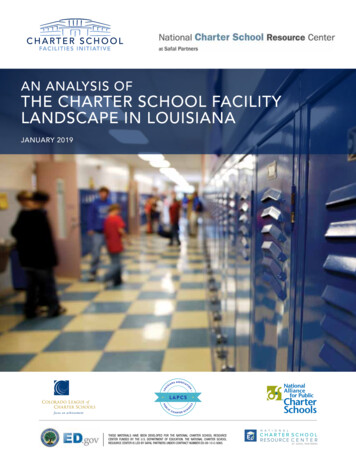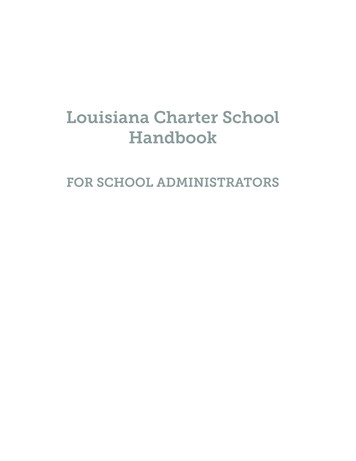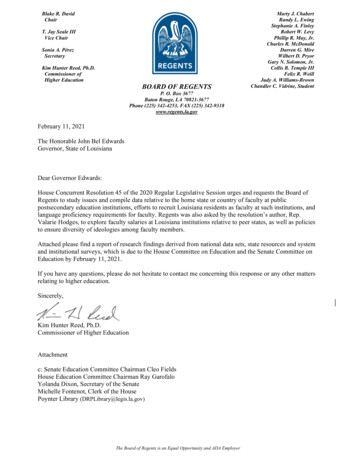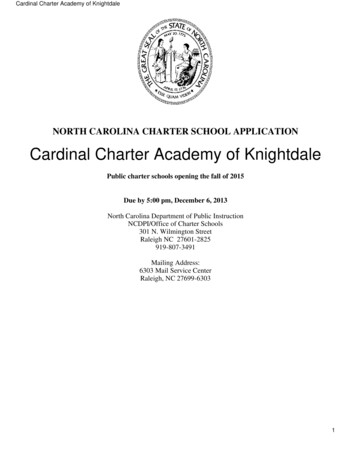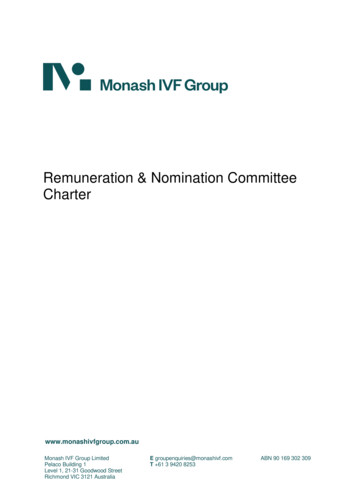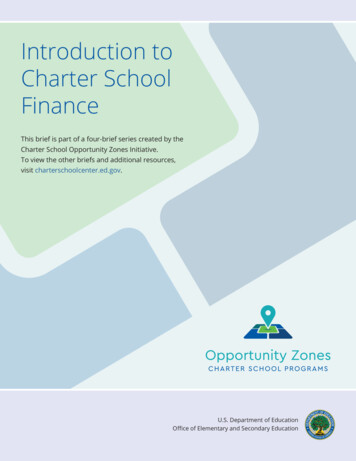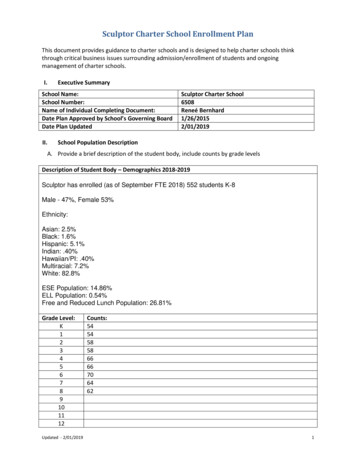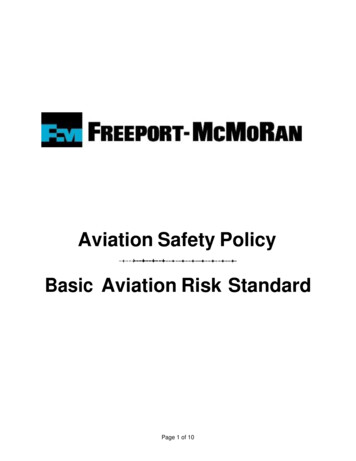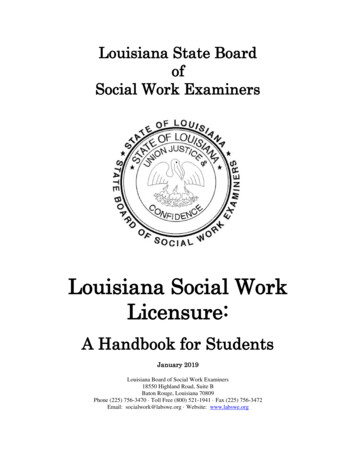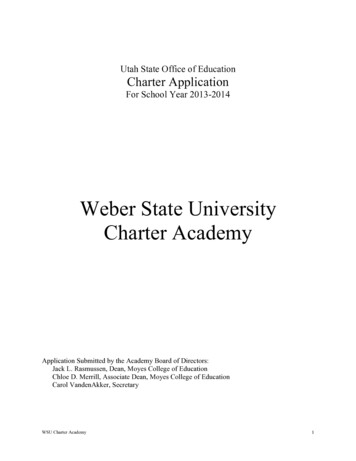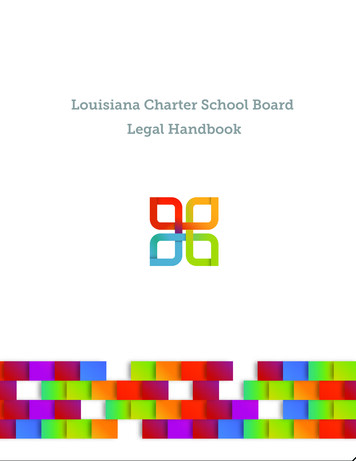
Transcription
Louisiana Charter School BoardLegal Handbook
THIS PUBLICATION HAS BEEN MADE POSSIBLEWITH THE GENEROUS SUPPORT OF:The Booth-Bricker FundThe Frost Foundation, Ltd.Louisiana Association of Public Charter SchoolsPro Bono Publico FoundationRosaMary FoundationPREPARED IN COLLABORATION BY:Louisiana AppleseedLouisiana Association of Public Charter SchoolsAlvin Miester of Sher Garner Cahill Richter Klein and Hilbert, L.L.C.Adams and Reese LLPNew Schools for New OrleansJones WalkerAkin GumpBoard on Track2014
Louisiana Charter School BoardLegal Handbook2014 2014
IntroductionFirst and foremost, thank you for your service as a Charter School Board Member. A successful charter schoolbegins with a well-informed, engaged board. As a volunteer, you have agreed to contribute your time and energy to helpprovide high-quality educational options to children across the state of Louisiana—quite an admirable task.The goal of this handbook is to help explain many of the complex rules and regulations that apply to charter schools, as wellas help you understand your roles and responsibilities as a Charter School Board Member. Please note that this handbookis a summary of the existing rules and regulations and is not intended to cover all scenarios your school may face; noris it designed to provide legal advice. It is always wise to consult with an attorney regarding issues specific to your school.Be sure to check with your Authorizer as to the most current laws and policies that apply.Essentially, the role of a Charter School Board is two-fold: (1) to exercise final authority in matters affecting the charter school;and, (2) to ultimately be held accountable to the Charter Authorizer for the school’s academic performance, financial health,and compliance with applicable laws and regulations. To help you better understand these roles and duties, this handbookis split into three major sections – Board Governance, Public Laws, and School Oversight. The Board Governance sectioncovers the general responsibilities, requirements, and restrictions placed upon Charter School Board Members; the PublicLaws section deciphers the five public laws Charter School Board Members must comply with; and, the School Oversightsection expounds upon a Charter School Board Member’s duties in overseeing the school’s students and personnel.Moreover, this handbook also includes information about the history of charter schools, the laws and policies that governLouisiana’s charter schools, a glossary of commonly used terms, and various appendices that should be useful tools for you.Should you or your board still have questions after reviewing this handbook, Louisiana Appleseed and the Louisiana Association of Public Charter Schools may have resources available to help guide you. Again, thank you for willingness to volunteeras a Charter School Board Member. Your dedication to Louisiana’s students is much appreciated.
Table of ContentsI. Louisiana Charter Schools: OverviewA. What are Charter Schools? . . . . . . . . . . . . . . . . . . . . . . . . . . . . . . . . . . . . . . . . . . . . . . . . . . . . . . . . . . . . . . . . . . . . . . 7B. Types of Charters . . . . . . . . . . . . . . . . . . . . . . . . . . . . . . . . . . . . . . . . . . . . . . . . . . . . . . . . . . . . . . . . . . . . . . . . . . . . 8C. The Charter Contract . . . . . . . . . . . . . . . . . . . . . . . . . . . . . . . . . . . . . . . . . . . . . . . . . . . . . . . . . . . . . . . . . . . . . . . . . 10D. Accountability, Renewal, and Revocation . . . . . . . . . . . . . . . . . . . . . . . . . . . . . . . . . . . . . . . . . . . . . . . . . . . . . . . . . . 11E. Contract Amendments . . . . . . . . . . . . . . . . . . . . . . . . . . . . . . . . . . . . . . . . . . . . . . . . . . . . . . . . . . . . . . . . . . . . . . . .12II. Charter School BoardsA. Purpose and Structure . . . . . . . . . . . . . . . . . . . . . . . . . . . . . . . . . . . . . . . . . . . . . . . . . . . . . . . . . . . . . . . . . . . . . . . .15B. General Responsibilities . . . . . . . . . . . . . . . . . . . . . . . . . . . . . . . . . . . . . . . . . . . . . . . . . . . . . . . . . . . . . . . . . . . . . . 16C. Governance . . . . . . . . . . . . . . . . . . . . . . . . . . . . . . . . . . . . . . . . . . . . . . . . . . . . . . . . . . . . . . . . . . . . . . . . . . . . . . . .17D. Responsibility Matrix . . . . . . . . . . . . . . . . . . . . . . . . . . . . . . . . . . . . . . . . . . . . . . . . . . . . . . . . . . . . . . . . . . . . . . . . . 18E. Restrictions (All Charter Schools) . . . . . . . . . . . . . . . . . . . . . . . . . . . . . . . . . . . . . . . . . . . . . . . . . . . . . . . . . . . . . . . . 19F. Restrictions (BESE-Authorized Schools) . . . . . . . . . . . . . . . . . . . . . . . . . . . . . . . . . . . . . . . . . . . . . . . . . . . . . . . . . . . 20G. Requirements (BESE-Authorized Schools) . . . . . . . . . . . . . . . . . . . . . . . . . . . . . . . . . . . . . . . . . . . . . . . . . . . . . . . . . .21III. Board Compliance with Public LawsA. Public Laws . . . . . . . . . . . . . . . . . . . . . . . . . . . . . . . . . . . . . . . . . . . . . . . . . . . . . . . . . . . . . . . . . . . . . . . . . . . . . . . .25B. Code of Ethics . . . . . . . . . . . . . . . . . . . . . . . . . . . . . . . . . . . . . . . . . . . . . . . . . . . . . . . . . . . . . . . . . . . . . . . . . . . . . . 261. Reporting . . . . . . . . . . . . . . . . . . . . . . . . . . . . . . . . . . . . . . . . . . . . . . . . . . . . . . . . . . . . . . . . . . . . . . . . . . . . . . 262. Employment . . . . . . . . . . . . . . . . . . . . . . . . . . . . . . . . . . . . . . . . . . . . . . . . . . . . . . . . . . . . . . . . . . . . . . . . . . . . 263. Nepotism . . . . . . . . . . . . . . . . . . . . . . . . . . . . . . . . . . . . . . . . . . . . . . . . . . . . . . . . . . . . . . . . . . . . . . . . . . . . . . 264. Compensation . . . . . . . . . . . . . . . . . . . . . . . . . . . . . . . . . . . . . . . . . . . . . . . . . . . . . . . . . . . . . . . . . . . . . . . . . . . 275. Recusal . . . . . . . . . . . . . . . . . . . . . . . . . . . . . . . . . . . . . . . . . . . . . . . . . . . . . . . . . . . . . . . . . . . . . . . . . . . . . . . . 27C. Open Meetings Law . . . . . . . . . . . . . . . . . . . . . . . . . . . . . . . . . . . . . . . . . . . . . . . . . . . . . . . . . . . . . . . . . . . . . . . . . . 281. Applying Open Meetings Law . . . . . . . . . . . . . . . . . . . . . . . . . . . . . . . . . . . . . . . . . . . . . . . . . . . . . . . . . . . . . . . . 282. Giving Notice of Meetings . . . . . . . . . . . . . . . . . . . . . . . . . . . . . . . . . . . . . . . . . . . . . . . . . . . . . . . . . . . . . . . . . . . 303. Executive Session . . . . . . . . . . . . . . . . . . . . . . . . . . . . . . . . . . . . . . . . . . . . . . . . . . . . . . . . . . . . . . . . . . . . . . . . 324. Board Meeting Minutes . . . . . . . . . . . . . . . . . . . . . . . . . . . . . . . . . . . . . . . . . . . . . . . . . . . . . . . . . . . . . . . . . . . . 33D. Local Government Budget Act . . . . . . . . . . . . . . . . . . . . . . . . . . . . . . . . . . . . . . . . . . . . . . . . . . . . . . . . . . . . . . . . . . 341. Sound Financial Practices . . . . . . . . . . . . . . . . . . . . . . . . . . . . . . . . . . . . . . . . . . . . . . . . . . . . . . . . . . . . . . . . . . 342. Mandatory Financial Reports . . . . . . . . . . . . . . . . . . . . . . . . . . . . . . . . . . . . . . . . . . . . . . . . . . . . . . . . . . . . . . . . 353. Budget Preparation . . . . . . . . . . . . . . . . . . . . . . . . . . . . . . . . . . . . . . . . . . . . . . . . . . . . . . . . . . . . . . . . . . . . . . . 35
4. Budget Notice and Public Participation . . . . . . . . . . . . . . . . . . . . . . . . . . . . . . . . . . . . . . . . . . . . . . . . . . . . . . . . . 365. Budget Adoption/Amendments . . . . . . . . . . . . . . . . . . . . . . . . . . . . . . . . . . . . . . . . . . . . . . . . . . . . . . . . . . . . . . 36E. Public Records Act . . . . . . . . . . . . . . . . . . . . . . . . . . . . . . . . . . . . . . . . . . . . . . . . . . . . . . . . . . . . . . . . . . . . . . . . . . . 371. Public Records . . . . . . . . . . . . . . . . . . . . . . . . . . . . . . . . . . . . . . . . . . . . . . . . . . . . . . . . . . . . . . . . . . . . . . . . . . . 372. Common Exemptions to the Public Records Act . . . . . . . . . . . . . . . . . . . . . . . . . . . . . . . . . . . . . . . . . . . . . . . . . . 373. Protecting Public Records . . . . . . . . . . . . . . . . . . . . . . . . . . . . . . . . . . . . . . . . . . . . . . . . . . . . . . . . . . . . . . . . . . 384. Requesting Public Records . . . . . . . . . . . . . . . . . . . . . . . . . . . . . . . . . . . . . . . . . . . . . . . . . . . . . . . . . . . . . . . . . . 395. Responding to Public Records Requests . . . . . . . . . . . . . . . . . . . . . . . . . . . . . . . . . . . . . . . . . . . . . . . . . . . . . . . . 396. Fees and Accommodations . . . . . . . . . . . . . . . . . . . . . . . . . . . . . . . . . . . . . . . . . . . . . . . . . . . . . . . . . . . . . . . . . .39F. Public Bid Law . . . . . . . . . . . . . . . . . . . . . . . . . . . . . . . . . . . . . . . . . . . . . . . . . . . . . . . . . . . . . . . . . . . . . . . . . . . . . .401. Public Works Projects . . . . . . . . . . . . . . . . . . . . . . . . . . . . . . . . . . . . . . . . . . . . . . . . . . . . . . . . . . . . . . . . . . . . . .412. Public Works Projects less than or equal to 150,000 . . . . . . . . . . . . . . . . . . . . . . . . . . . . . . . . . . . . . . . . . . . . . . . 413. Contracts for School Food Services . . . . . . . . . . . . . . . . . . . . . . . . . . . . . . . . . . . . . . . . . . . . . . . . . . . . . . . . . . . .424. Advertising Requirements . . . . . . . . . . . . . . . . . . . . . . . . . . . . . . . . . . . . . . . . . . . . . . . . . . . . . . . . . . . . . . . . . . 425. Change Orders and Addenda . . . . . . . . . . . . . . . . . . . . . . . . . . . . . . . . . . . . . . . . . . . . . . . . . . . . . . . . . . . . . . . . 436. Opening of Bids . . . . . . . . . . . . . . . . . . . . . . . . . . . . . . . . . . . . . . . . . . . . . . . . . . . . . . . . . . . . . . . . . . . . . . . . . . 437. Evaluation and Award . . . . . . . . . . . . . . . . . . . . . . . . . . . . . . . . . . . . . . . . . . . . . . . . . . . . . . . . . . . . . . . . . . . . . 448. Bid Cancellation and Withdrawal . . . . . . . . . . . . . . . . . . . . . . . . . . . . . . . . . . . . . . . . . . . . . . . . . . . . . . . . . . . . . 44IV. Board Oversight DutiesA. Personnel . . . . . . . . . . . . . . . . . . . . . . . . . . . . . . . . . . . . . . . . . . . . . . . . . . . . . . . . . . . . . . . . . . . . . . . . . . . . . . . . . 471. School Leader Compass Evaluations . . . . . . . . . . . . . . . . . . . . . . . . . . . . . . . . . . . . . . . . . . . . . . . . . . . . . . . . . . . 472. Teacher Requirements . . . . . . . . . . . . . . . . . . . . . . . . . . . . . . . . . . . . . . . . . . . . . . . . . . . . . . . . . . . . . . . . . . . . . 483. Employee Policies . . . . . . . . . . . . . . . . . . . . . . . . . . . . . . . . . . . . . . . . . . . . . . . . . . . . . . . . . . . . . . . . . . . . . . . . 48B. Students . . . . . . . . . . . . . . . . . . . . . . . . . . . . . . . . . . . . . . . . . . . . . . . . . . . . . . . . . . . . . . . . . . . . . . . . . . . . . . . . . . 501. Enrollment Admissions . . . . . . . . . . . . . . . . . . . . . . . . . . . . . . . . . . . . . . . . . . . . . . . . . . . . . . . . . . . . . . . . . . . . 502. Enrollment Special Education Requirements . . . . . . . . . . . . . . . . . . . . . . . . . . . . . . . . . . . . . . . . . . . . . . . . . . . . 523. Enrollment English Language Learner Requirements . . . . . . . . . . . . . . . . . . . . . . . . . . . . . . . . . . . . . . . . . . . . . . . 534. Transportation . . . . . . . . . . . . . . . . . . . . . . . . . . . . . . . . . . . . . . . . . . . . . . . . . . . . . . . . . . . . . . . . . . . . . . . . . . . 545. Discipline and Complaint Procedure . . . . . . . . . . . . . . . . . . . . . . . . . . . . . . . . . . . . . . . . . . . . . . . . . . . . . . . . . . . 54V. Appendices . . . . . . . . . . . . . . . . . . . . . . . . . . . . . . . . . . . . . . . . . . . . . . . . . . . . . . . . . . . . . . . . . . . . . . . . . . . . . . 57
Louisiana Charter Schools:OverviewWhat are Charter Schools?Types of ChartersThe Charter ContractAccountability, Renewal, and RevocationContract Amendments
Louisiana Charter Schools: Overview8
I. Louisiana Charter Schools: OverviewA. Charter Schools: What are Charter Schools?Unlike traditional public schools—where schools located within a certain jurisdiction are subject to uniform rules andregulations set by a local parish school board—charter schools are independent public schools that are given educational and operational autonomy in exchange for performance-based accountability.In essence, charter schools operate from 3 basic principles:1. Choice: Parents select the school their child attends.2. Flexibility: Charter schools are free to make timely decisions on issues specific to their school such asdeveloping curricula, structuring the school day, creating a balanced budget, and hiring teachers whomeet the needs of their students.3. Accountability: In exchange for autonomy, charter schools are held accountable via a performance-basedcontract and must meet certain academic, financial, and legal standards within an allotted time frame or riskclosure of charter school.Note: Minnesota enacted the first chartering system in 1991. Soon thereafter, Louisiana enacted its Charter SchoolDemonstration Program (“Charter Law”) in 1995.In Louisiana there are 3 primary sources for charter school laws, rules, and regulations:1. Law: Charter School Demonstration Programs – La. R.S. 17:3971, et seq. Charter Law is typically updated or amended annually during the Legislative Session.2. Policy: The Louisiana Board of Elementary and Secondary Education’s (“BESE”) Bulletin 126(28 La. Admin. Code, Bulletin 126) governs the implementation of Charter School Law. Most of itsprovisions apply to Type 2 & 5 charter schools only, but some provisions apply to all charter schools. Parish school boards may have specific rules that differ from BESE’s. Be sure to check local rules ifauthorized by a Local School Board (“LSB”). BESE & LSB policies are updated often. Regularly check in with your Authorizer for the mostcurrent version.3. Contract: Charter Contracts are unique to each individual school. Always review your contract forrequirements specific to your school and its mission. Contracts can be amended during the contract term (often subject to Authorizer approval) orrenegotiated during the renewal process.Louisiana Charter Schools: Overview9
Louisiana Charter Schools: OverviewB.Charter Schools: Types of ChartersIn Louisiana, there are 7 Types of Charter Schools:1. Type 1: a new school chartered by an LSB.2. Type 1B: a new school or a pre-existing school chartered by a BESE-certified Local Charter Authorizer (“LCA”).3. Type 2: a new school or a converted pre-existing school chartered by BESE.4. Type 3: a converted pre-existing school chartered by an LSB.5. Type 3B: a former Type 5 charter school transferred from the Recovery School District (“RSD”) to an LSB.6. Type 4: a new school or a converted pre-existing school chartered by BESE to an LSB.7. Type 5: a formerly “failing” school chartered by BESE and supervised by the RSD.Source: La. R.S. 17:3973; 28 La. Adm. Code, Bulletin 126, §107.LCAs: To qualify as a Local Charter Authorizer, an entity must meet certain qualifications including: being a stateagency or a non-profit corporation with an educational mission; being incorporated for at least 3 years; having atleast 500,000 in assets net of liabilities; and planning to open at least 5 charter schools.Type 3B Charter Schools: This Type was created to account for the return of a formerly failing Type 5 charter schoolunder the RSD to an LSB. The LSB shall permit a Type 3B charter school to remain in the facility in which it was locatedat the time of transfer or provide it with another facility for use. Pursuant to rules and regulations adopted by BESE,it may require a Type 3B charter school to participate in unified processes common to other public schools located inthe same parish or school district boundaries such as processes for student enrollment, expulsion, and transportation.Additionally, Type 3B schools are permitted to remain as their own Local Education Agency (“LEA”).Source: La. R.S. 17:3981.1, 17:3973; 28 La. Adm. Code, Bulletin 126, §§301, 401-423.10
Types of Charter Schools Chart:TypeAuthorizerContractStart-Up vs. ConversionAdmissions1Local SchoolBoardLSB non-profitboardStart-upAt-risk percentage requirements;may have admission requisitesconsistent with mission1BLocal CharterAuthorizerLCA non-profitboardEitherMay have admission requisitesconsistent with mission2BESEBESE non-profitboardEitherAt-risk percentage requirements;may have admission requisitesconsistent with mission3Local SchoolBoardLSB non-profitboardConversionMay have admission requisitesconsistent with mission3BLocal SchoolBoard*with financialoversight fromBESELSB non-profitboardConversion*former Type 5returned to an LSBOpen enrollment only4BESEBESE local schoolboardEitherAt-risk percentage requirements;may have admission requisitesconsistent with mission5BESEBESE non-profitboardConversion*under the jurisdiction of the RSDOpen enrollment onlyLouisiana Charter Schools: Overview11
Louisiana Charter Schools: OverviewC.Charter Schools: The Charter ContractA public charter school comes to life through, and is governed by, a Charter Contract between a Charter Operatorand a Charter Authorizer.Similar to all other service contracts, the Charter Contract is a legal agreement that sets the expectations for the Operatorand Authorizer over a set term. It defines both the Operator’s rights to manage the school and the Authorizer’s monitoringand oversight responsibilities. Charter Operator the non-profit corporation or LSB (Type 4) authorized to operate a charter school. Charter Authorizer an LSB, an LCA, or BESE; responsible for monitoring and overseeing authorizedcharter schools. Education Service Providers (ESPs)/Education Management Organizations (EMOs) Charter Operatorsmay hire a third-party to manage the school’s academic, fiscal, and operational services on behalf of theschool’s board of directors. These for-profit companies are commonly referred to as Education Service Providers(ESPs) or Education Management Organizations (EMOs). Charter Management Organizations (CMOs) Charter Operators authorized to operate more than one charterschool through a non-profit network are commonly referred to as Charter Management Organizations (CMOs).Note: Even though the Charter Contract encompasses the agreed-to-provisions between an Operator and anAuthorizer over a set term, Charter School Law, an Authorizer’s policy, and BESE policy may at times overrideprovisions of your Contract.* Law Policy ContractInsider Tip: Know the terms of your charter agreement and always check with your Authorizer asto any policy changes that may affect your contract.Source: La. R.S. 17:3973; 28 La. Adm. Code, Bulletin 126, §§103, 701-707.12
D.Charter Schools: Accountability, Renewal, and RevocationRegardless of type, the validity of each Charter Contract is contingent upon the school’s ability to meet certainacademic, financial, and legal standards within an allotted time frame. If the school meets those requirements,then the contract can be renewed for another set time period; but if the school fails to do so, the contract cannot berenewed and the school will either be closed altogether or transferred to a different Operator. Additionally, the CharterContract can be revoked at any time by a majority vote of the Authorizer if the Authorizer finds that the Operator violatesthe contract, fiscal standards, or the law (this type of revocation generally occurs when there is a gross violation, or thehealth and safety of students are at risk).Renewal Changes: The academic, financial, and legal standards for charter schools are periodically revised byAuthorizers; be sure to check with your Authorizer as to any policy changes that may impact your school’s renewal—particularly changes to academic performance standards.Revocation Terms: Be familiar with the specific policy and contractual provisions that permit your Authorizer to immediately revoke the contract, as well as the related procedures for revocation.Renewal Timeline: All charter schools are initially authorized for a single 4 year term that may be extended for a maximum initialterm of 5 years. The school’s extension review is held during its 4th year of operation.Charters may be renewed for additional periods of 3-10 years based on performance.An Authorizer must notify an Operator of its renewal decision by January 31 of the year in which thecontract term expires.Automatic Renewal: BESE permits its high-performing charter schools to bypass the renewal process and be automatically renewedif they meet certain benchmark standards (particularly around academic and financial performance). Checkwith your Authorizer and the most current version of BESE Bulletin 126 to see if your school is eligible forautomatic renewal.Source: La. R.S. 17:3992, 17:3998; 28 La. Adm. Code, Bulletin 126, §§ 1301-1303, 1501-1503.Louisiana Charter Schools: Overview13
Louisiana Charter Schools: OverviewE.Charter Schools: Contract AmendmentsAn Operator, through its governing Board, may seek to amend its Charter Contract during the course of the contract’s term.All amendments must be submitted to the Authorizer: Material Amendments require subsequent approval by the Authorizer. Non-Material Amendments are effective upon approval by the Charter School’s Board.Authorizers regularly update what qualifies as “material” and “non-material” amendments, so always check with yourAuthorizer before amending the contract.Note: Generally, material amendments make substantive changes to a charter school’s governance, operational,or academic structure, while non-material amendments make non-substantive changes, such as designated contactinformation for the school.Amendment Requirements: No amendment may be the basis of extending a contract’s term. The amendment must be designed to help further the stated objectives of the school. An amendment must be proposed and approved by the school’s governing authority (the Charter School Board). Charter schools seeking to enroll more than 120% of the total number of students approved in the chartercontract must formally amend the contract to permit the enrollment increase.Source: La. R.S. 17:3991(C), 17:3992(B); 28 La. Adm. Code, Bulletin 126, §§ 1901-1905.14
CharterSchool BoardsPurpose and StructureGeneral ResponsibilitiesGovernanceResponsibility MatrixRestrictions (All Charter Schools)Restrictions (BESE-Authorized Schools)Requirements (BESE-Authorized Schools)
II. Charter School BoardsA.The Charter School Board: Purpose & StructureA Charter Operator must be organized as a non-profit corporation, and its Board of Directors, as holder of the CharterContract, exercises final authority in matters affecting the school. The Board may utilize any power and perform anyfunction (not prohibited by law) necessary, requisite, or proper for the management of the school. Accordingly,the Board is ultimately held responsible for the academic, financial, and legal performance of the school.Source: La. R.S. 17:3991; 28 La. Adm. Code, Bulletin 126, §§ 103, 501, 2101-2107.Fundamentally, the Board is a group of dedicated, committed individuals that come together as a collective unit to: Share their time and expertise to govern the school; Provide the school with strategic leadership; Protect the public’s interest; and Enable the school to achieve its mission.Ideal Qualities of Charter School Board Members: Passionate about the school’s mission. Time to commit as volunteers. Willingness and ability to serve as the school’s governor, ambassador, sponsor, and consultant. Ability to understand the distinctions between governance and management. Comfortable with a start-up environment. Ability to ask tough questions.Source: http://www.boardontrack.com/Charter School Boards17
Charter School BoardsB. The Charter School Board: General ResponsibilitiesCharter School Board Members, like other non-profit boards, are required to act in good faith and to exert the same levelof diligence, care, judgment, and skill that an ordinarily prudent person would exercise under similar circumstances and inlike positions. As such, Board Members have three basic fiduciary duties:1. Duty of Care: exercising sound, legal, and ethical board best practices and acting on an informedbasis—examples: Being an active Board Member and participant. Participating in risk assessment and strategic planning discussions. Routinely evaluating the school, School Leader, and Board to assess the organization’s performance. Implementing and enforcing any policies that safeguard the financial and operational integrityof the school.Purchasing all necessary board and school liability insurance as required by your Authorizer.2. Duty of Loyalty: giving undivided allegiance when making decisions affecting your school—examples: Avoiding conflicts of interests/abiding by conflicts of interests policies. Never using school/board information for personal gain. Being strong promoters and advocates for your school.3.Duty of Obedience: acting in furtherance of the law and the school’s goals and mission—examples: Complying with all applicable state and federal laws governing charter schools, including lawsapplicable to Louisiana public bodies. Acting in congruence with the Board’s purpose, articles of incorporation and bylaws,and Charter Contract.Being mission-aligned so that your actions are consistent with the school’s goals, vision, and mission. Source: La. R.S. 12:226(A); 28 La. Adm. Code, Bulletin 126, §§ 2101-2107.18
C.The Charter School Board: GovernanceIn addition to its general responsibilities, a Charter School Board is specifically charged with overseeing the school’sperformance. But while the Board’s overall purpose is to govern the charter school, it is not tasked with running theschool’s daily operations (that duty belongs to the school’s Leader). Indeed, a successful Charter School Board has aclear understanding of its direct and indirect duties, as well as its primary and secondary responsibilities:Governance Duties: Academic Performance– The Board indirectly governs the school’s academic success through its oversight and evaluation ofthe School Leader. Financial Performance– The Board directly governs the school’s finances by developing and maintaining a balanced budgetand ensuring adequate resources. Legal Compliance– The Board is directly responsible for its ability to comply with the various laws applicable toLouisiana public bodies.– The Board is indirectly responsible for the school’s ability to comply with the various laws applicable topublic schools through its creation and enforcement of school, student, and employee policies.Governance Responsibilities: Primary– Hire, support, and evaluate the School Leader.– Strategically plan for the school’s future through policy.– Maintain legal and ethical integrity and provide financial oversight.– Develop and maintain an effective and competent Board. Secondary– Secure adequate resources for the school (fundraising). Charter School Boards may solicit, accept, and administer donations or any other financial assistance(not prohibited by law) for educational purposes on behalf of the charter school.– Serve as the school’s ambassador to the community and greater public
Louisiana Charter Schools: Overview 10 B. Charter Schools: Types of Charters In Louisiana, there are 7 Types of Charter Schools: 1. Type 1: a new school chartered by an LSB. 2. Type 1B: a new school or a pre-existing school chartered by a BESE-certified Local Charter Authorizer ("LCA"). 3.
